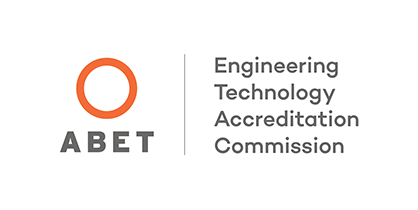CT State Community College Catalog 2023-2024
- New students enrolling for the first time in Fall 2023 will begin as students of Connecticut State Community College under this catalog.
- Continuing students from one of the 12 community colleges will be transitioned into a CT State program in this catalog as of the start of the Fall 2023 term.
- The policies, courses and programs described are applicable as of the Fall 2023 term and may be updated as circumstances require.
|
CT State Community College’s Electronic Engineering Technology program is accredited by the Engineering Technology Accreditation Commission of ABET, http://www.abet.org. ABET accreditation provides assurance that the curriculum meets the quality standards that the industry employers of our graduates require and that the academic rigor allows for transferability to four-year electronic technology and electrical engineering programs.
Students will gain the credentials and skills required to enter the workforce in one of the many diverse industrial sectors seeking qualified electronic technicians. Our graduates gain careers in fields such as the electric power utilities, aviation, manufacturing, controls and automation. Typical job titles are electronic technician, junior designer, field service technician, repair technician, test technician, airway transportation system specialist, scada technician, substation designer, and junior controls/automation engineer. The Electronic Engineering Technology graduate is an important and much sought after contributor to the engineering team in Connecticut’s ever-changing high technology industries.
The program emphasizes the fundamentals of DC and AC circuit theory, solid-state electronics and digital electronics, but also stresses the role of computers, computer software, CAD systems, programming, microcontrollers, programmable logic controllers (PLC’s), data acquisition, instrumentation, robotics, and control systems. The classroom taught theory is fundamental to the learning process and practical “hands-on” experience is an extensive and integral component of the curriculum. The Electronic Engineering Technology graduate will be adept at building, testing, and troubleshooting many types of electrical circuits and systems using state-of-the-art electronic instrumentation and software. A required senior capstone project course will allow the student to demonstrate mastery of the concepts and tools learned as they use electronic CAD software to design a printed circuit board (PCB), use proper fabrication techniques to assemble the PCB, test, and troubleshoot until a functioning project is realized.
The broad based curriculum provides a solid foundation for graduates to confidently enter the work force or transfer to a four-year university.

Program Educational Objectives
The electronic engineering technology graduate will be prepared to make achievements in the following areas within a few years after graduation:
- Obtain employment in an electronic engineering technology related position.
- Undertake baccalaureate studies in electronic engineering technology or any related engineering program.
- Uphold professional expectations by conducting work in a safe and ethical manner.
- Function effectively individually and serve as a team leader on collaborative projects.
- Continually improve skills by undertaking professional development opportunities.
Student Outcomes
Upon successful completion of the program requirements, the graduate will be able to:
- apply knowledge, techniques, skills and modern tools of mathematics, science, engineering, and technology to solve well-defined engineering problems appropriate to the electronic engineering technology discipline;
- design solutions for well-defined technical problems and assist with the engineering design of systems, components, or processes appropriate to the discipline;
- apply written, oral, and graphical communication in well-defined technical and non-technical environments; and an ability to identify and use appropriate technical literature;
- conduct standard tests, measurements, and experiments and to analyze and interpret the results using appropriate electronic instrumentation and computer software for both analog and digital circuits;
- function effectively as a member of a technical team; and
- work in a safe and ethical manner and demonstrate the ability recognize ethical issues and utilize the IEEE code of ethics as a guide to determine appropriate course of action in response to these issues.
The Electronic Engineering Technology program is accredited by the Engineering Technology Accreditation Commission of ABET, www.ABET.org. The program courses are available at the Naugatuck Valley campus. Graduates of the program transfer to Central Connecticut State University’s B.S. Electronics Technology program, University of New Haven’s B.S. Electrical & Computer Engineering program, and Fairfield University’s Electrical Engineering program. Graduates have the credentials to start careers in the in-demand electronic engineering technology profession at job classification levels that only the A.S. degree allows.